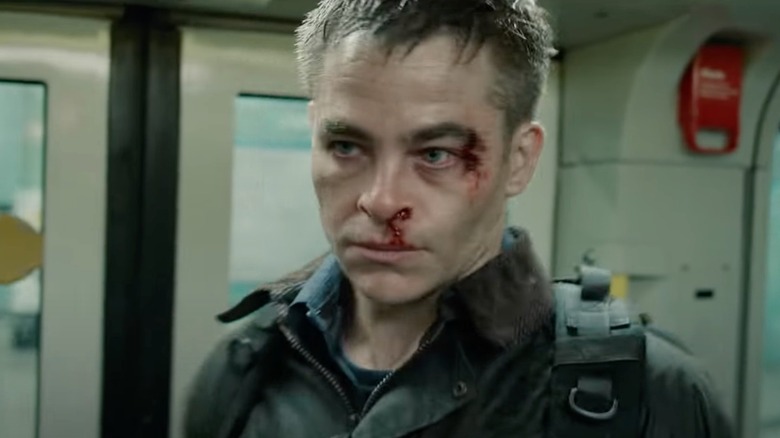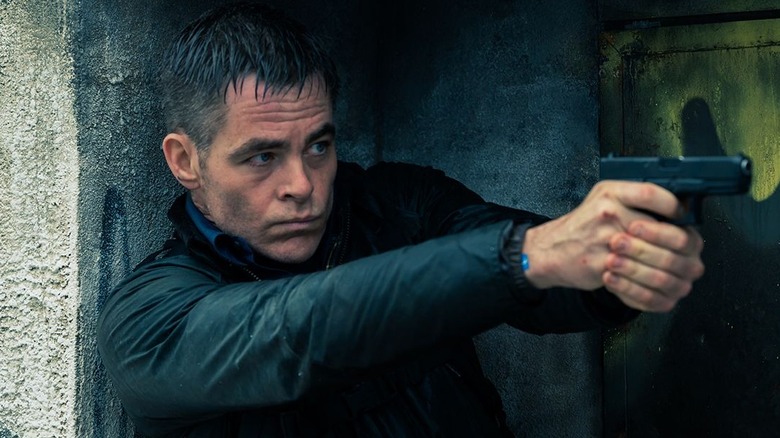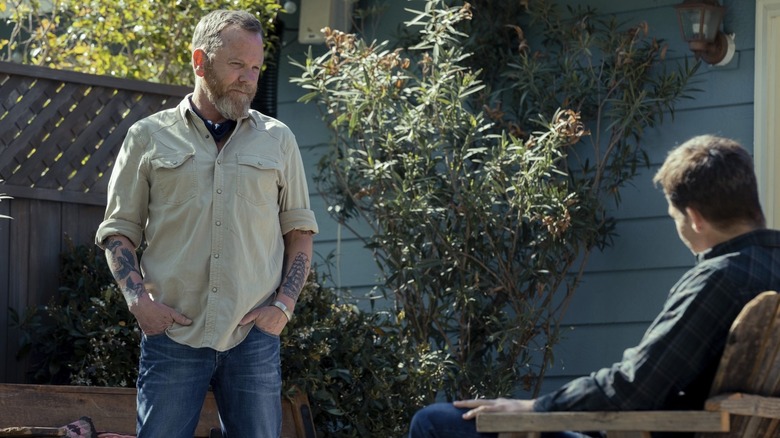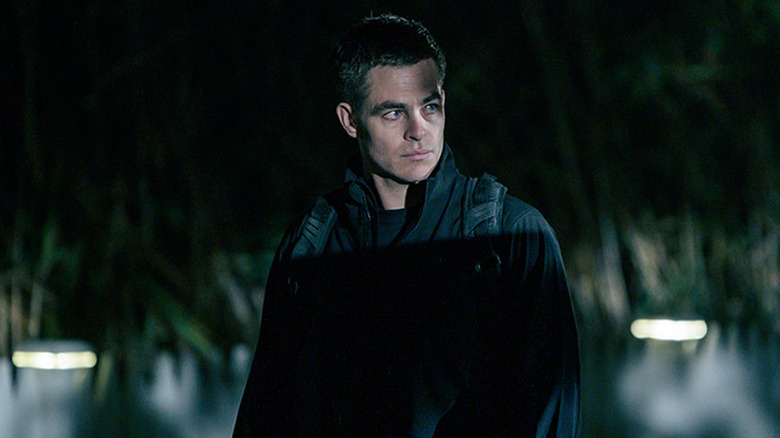The Contractor Director Tarik Saleh On The Messy World Of Military Contractors [Interview]
Tarik Saleh's Paramount thriller "The Contractor" premieres this week, bringing the shady, clandestine world of military contractors to the screen. The film sees injured Special Forces vet James Harper (an excellent Chris Pine) forced into the shady world of military contractors after he's discharged without any of the perks or care he was previously guaranteed upon honorable discharge. Harper's first outing isn't exactly what he signed up for, triggering a series of escalating consequences in a timely, smart thriller.
"The Contractor" takes a more critical look into the military's approach to veterans (as well as our modern penchant for mercenary-led combat) than many contemporary films. I spoke with Saleh about the movie's interesting look into the secretive contracting world, the origins of the story, and more.
This interview has been lightly edited for clarity and brevity.
'Whoever wrote the script knew what he was writing about'
I thought the performances in "The Contractor" were great, with some really well-executed action sequences. In some ways this is a departure from your work so far. What attracted you to this particular project?
Both yes and no. In a way, it sort of came together because I've always liked genre films. In Europe, it's almost blasphemy to talk about genre, but "The Nile Hilton Incident" is a film noir and "Metropia" is a sort of weird sci-fi movie, and "Tommy," the film I made before that, is a gangster film. Before that, I was doing documentaries that were all sort of dealing with this shady world of contracting, unconventional warfare.
My first documentary, "Sacrificio: Who Betrayed Che Guevara?" was about the people that killed Che Guevara, basically, and a lot of them were in the gray area of unconventional warfare. I mean, it was CIA operatives that didn't have American passports and things like that. And then "Gitmo," my Guantanamo documentary, also dealt with contracting. So when I read the script, right away I felt that whoever wrote the script knew what he was writing about. He had it down pretty close to reality.
Also, one great thing with the script was how well written the character was. I felt that the character was very well written and I liked the character right away. Because I read the script before I knew that Pine was attached to it, and I saw the character right in front of me. When [producer] Basil [Iwanyk] at Thunder Road told me that it was Chris Pine that was attached to it and he asked me, "Are you a fan?" I said, "Absolutely. I think Chris Pine is an amazing actor." I liked him already from the first "Star Trek" film. I remember thinking, "Who is this guy? He's great!"
But I didn't see him in front of me when I read the script, which I think was helpful because, for me, when I met with Pine the first time and we talked about the film, it was important to talk about the character, and I think both Pine and I were aware that, even though we found similarities and things that we could connect to with the character, there are also big differences. It's very important to know those differences, to understand how we differ from him. I think one major difference is that neither me or Chris Pine have ever killed someone, and this man is an expert in that. He's been trained to do that very efficiently, and when he's finding himself out of work, there are a lot of people that are willing to pay a lot of money for that service.
'People are returning from these wars and no one is there to meet them'
I thought that the film was really poignant in a couple of very interesting ways. I thought that the focus on veterans basically getting wounded and spit out is incredibly timely, along with some of the pathogen-related elements. How was the story shaped?
It was in the script, and the script was written a long time ago. I think that's the magic of film: When you have a script that is really good, it is timeless in that way that it taps into something. It was even a problem, because when Covid came, that was after we had shot the film, we were like, "Holy ... okay, wait a second. This nightmare just became a reality." And when it came to veterans and also how they're spit out and all that, I think that it sort of helps that I'm European, in a way. As a person that has been a lot in the U.S., both for work and for also filming in the U.S.
So many people in the film industry, by the way, are veterans. A lot of people on the production are people that have been in the army or in the military, and I always felt that there was something strange in that there were these wars that were going on while people were acting like the wars were not going on. People going to IMAX, buying Frappuccinos, and it's like, 'It's not going on,' and then people are returning from these wars and no one is there to meet them: No parades, no nothing, not even protests. To me, that creates this numb feeling of nothingness — and I've talked with a lot of veterans about that, the feeling of being invisible when you come back, the feeling that all your experience that you had over there is worth nothing. People don't want to hear about it, they want to know what celebrities are wearing and the Kardashians, or whatever, and they have been on the other side of the world fighting a war.
'Rules don't apply in the contracting world because you're collateral damage'
Right.
That's not what the film is about. The film is about a man who has given himself to a belief that he is really fighting the good fight, and who is willing to die for his brother next to him, and that's what makes him an exceptional soldier. He is willing to give himself up, and then he steps into the world of contracting where all the rules of engagement doesn't exist, and brotherhood? Forget that, it's the corporate world, it's a whole different thing. You take no prisoners.
One thing I don't think people think about it, [is] why has America been so successful in its wars? One of the key elements of that is that an American soldier knows that he doesn't get left behind. He knows that. He knows that an American never leaves a man behind, they will always come back to get you, even if you are the only one left on the wrong side, they will come for you. That's a huge confidence in going into a battle. I remember the statement in the first Gulf War when Saddam said, "We have a million soldiers that we're willing to sacrifice for winning this war," and General Schwarzkopf just said, "We're not going to sacrifice one soldier." And that's the way you win a war. [But] those rules don't apply in the contracting world because you're collateral damage. You're a sandbag.
You're a commodity with a gun.
Yeah, you're commodity with a gun. Exactly right. You sign a contract. One soldier told me when you join the American army, you sign a blank check to Uncle Sam, but on the other hand, they are responsible for you. You are a number in the statistics, and they will come and get you. When you sign a contract with a private firm, it's not the same thing. You get paid, but no one is coming to get you. Maybe no one even knows that you are there in the first place. To me, that was a very interesting premise for this character that is a believer, and his belief is sort of used ... I don't want to spoil anything, but I think that even I would sign up with Kiefer Sutherland, I mean, when he [gives] his speech!
It's a good pitch!
It is a good pitch! I mean, I'm like "Yeah, I'm in. That sounds great."
"The Contractor" opens in theaters and on VOD on April 1, 2022.



